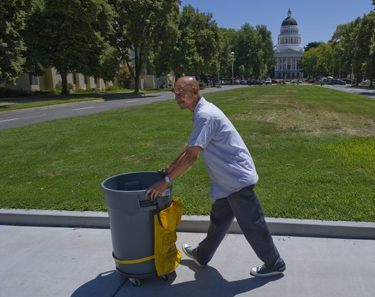Furloughs are back.

Dino Gomez, an employee of the state Department of General Services, collects trash around state buildings Wednesday after the governor ordered three furlough days a month, effective Sunday, for him and other state workers until a budget is passed. "He should have stuck to acting," Gomez said. (Hector Amezcua / [email protected])
Less a month after ending unpaid days off for more than 200,000 state workers, Gov. Arnold Schwarzenegger is bringing back a scaled-down version of the policy that will take effect on Sunday.
The governor made the decision this week after Controller John Chiang said that until lawmakers come up with a budget, he'll start issuing IOUs in August or September to conserve funds as long as possible. The state's cash could run out by October, the controller estimated.
"We have a fiscal crisis," Schwarzenegger spokesman Aaron McLear said Wednesday morning as he explained the new furlough order. "We're doing what we have to do to conserve cash."
Bruce Blanning, head of the 11,000-member Professional Engineers in California Government, said that the move is really designed to squeeze unions like his that haven't cut concessionary contract deals with the administration.
"It's more misguided pressure from the governor on those who won't agree with his program," Blanning said.
Like the furlough policy that ended June 30, the new plan laid out in Executive Order S-12-10 requires employees to take three unpaid days off per month. There's no termination date: Furloughs will end when lawmakers pass a 2010-11 budget. That could be weeks or months after the Legislature reconvenes next week.
About 156,000 employees are covered by the new program, reducing the state's monthly payroll costs by about $147.2 million per month, according to administration estimates. About $80 million of that is general-fund savings.
Roughly 73,000 employees are expressly excluded based on where they work or their unions' labor contract status.
Furlough-exempt employees include those at the Board of Equalization, the Franchise Tax Board, the Employment Development Department, State Compensation Insurance Fund, the California Housing Finance Authority and the California Earthquake Authority.
As with his last furlough order, Schwarzenegger exempted employees with the California Highway Patrol and the state Department of Forestry and Fire Protection.
The executive order doesn't explain the criteria for excluding those departments and agencies from furlough.
The order also excludes about 37,000 state workers in six unions, including those representing Highway Patrol officers and firefighters, that recently reached tentative labor agreements with the Schwarzenegger administration.
"We expect the Legislature to quickly ratify those contracts next week," McLear said.
The deals contain some concessions, including monthly furlough days - as many as 12 this fiscal year - and higher out-of-pocket employee pension contributions, that Schwarzenegger has made a condition of any labor agreement.
As part of the agreements, the administration promised that the Legislature will enact measures that will protect those workers from additional furloughs, minimum wage or both.
"We keep our promises to the unions," McLear said.
The 95,000-member SEIU Local 1000 and five other unions have been bargaining but haven't yet reached terms with the governor.
Managers and supervisors make up the remainder of the work force. Unless they work in an exempt department, they are subject to the furlough order.
Wednesday's order marks the third time that Schwarzenegger has unilaterally reduced state workers' hours and pay. In December 2008, with the state mired in a severe fiscal crisis, he directed that state workers take off two unpaid days per month.
Several state employee unions sued to block the order, but a Sacramento court in January 2009 agreed with Schwarzenegger that the crisis was an emergency that allowed the governor to mandate furloughs to address it. Twice-monthly furlough days started the next month for most of California's 235,000 or so state workers hired through the executive branch.
In June 2009, Schwarzenegger added a third furlough day each month for the 2009-10 fiscal year that started July 1, 2009, and ended June 30. The Legislature passed a budget that assumed the savings.
Although lawmakers failed to pass a budget last month, the governor ended furloughs as planned. Since then, the administration has tried - and so far failed - to hold state workers' pay to federal minimum wage during the budget impasse. All along, the administration has warned that every day the state goes without a budget would make furloughs or layoffs more likely.
Dino Gomez, a Department of General Services worker on cleanup duty Wednesday outside state office buildings, nevertheless wasn't buying the need for Schwarzenegger's order.
"He should have stuck to acting," Gomez said.











